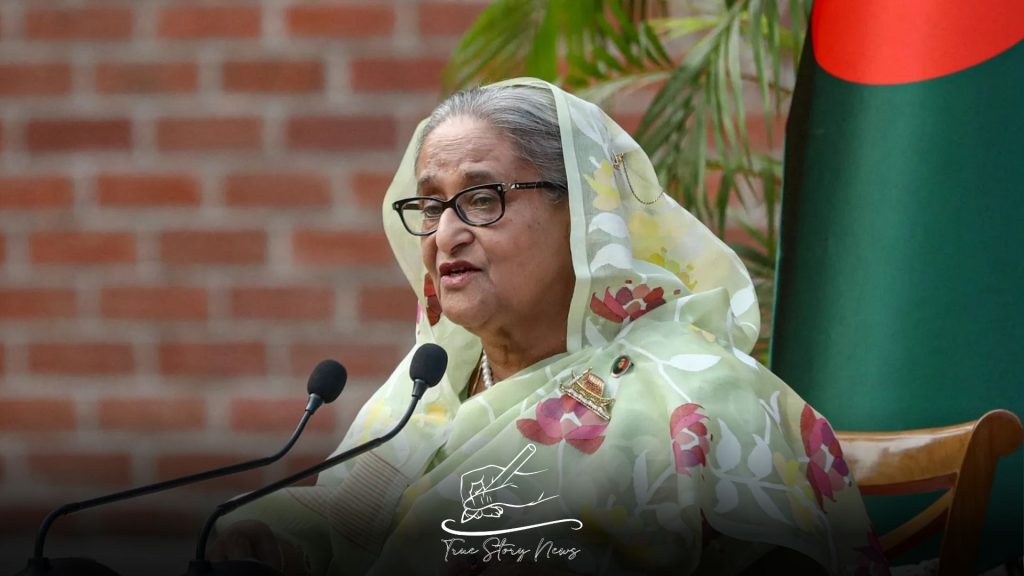Sheikh Hasina, the ousted prime minister of Bangladesh, has received a death sentence for crimes against humanity committed during the insurrection in July of the previous year.
Former Home Minister Asaduzzaman Khan Kamal received a death sentence. In contrast, former Inspector General of Police Chowdhury Abdullah Al-Mamun, who testified as a state witness, was sentenced to five years’ jail in the case.
The court additionally mandated the confiscation of the properties belonging to Hasina and Asaduzzaman in favour of the state.
Asaduzzaman is at large, whilst Mamun is in detention and has entered a guilty plea. Mamun has become a state witness, the first defendant to do so since the tribunal was established in 2010.
The three-member International Crimes Tribunal, presided over by Justice Md Golam Mortuza Mozumder, commenced the reading of sections of the 453-page judgment at approximately 12:30 PM, under stringent security measures and in a crowded courtroom.
The judgment states that Hasina, 78, now in India, received a death sentence on two charges.
She received the death penalty for Count 4 related to the shooting and murder of six unarmed demonstrators in Chankharpul, Dhaka, on August 5 of the previous year. In Count 5, the defendants were accused of killing six student demonstrators in Ashulia on the same day; five of them were subsequently burned post-mortem. At the same time, the sixth was reportedly ignited while still alive.
Hasina received a life sentence for inciting violence and directing the use of lethal force against demonstrative students. In Count 2, she was convicted of orchestrating the annihilation of student protesters utilising helicopters, drones, and lethal armaments.
Following the decision, Hasina stated that the ruling rendered against her was “biased and politically motivated.”
Hasina stated, “I am unafraid to confront my accusers in a legitimate tribunal where evidence can be evaluated and scrutinized impartially,” according to Reuters.
The panel sentenced Asaduzzaman to death on two counts.
Prosecutors charged the defendant with five counts, including failing to prevent murder, constituting crimes against humanity under Bangladeshi law. The prosecution has pursued the death penalty contingent upon a guilty verdict for the accused.
Prosecutors requested that the tribunal seize the assets of the three defendants upon conviction and allocate them to the victims’ relatives.
The defence, however, articulated optimism for their exoneration. Hasina has refuted all allegations.
This will be the tribunal’s inaugural ruling regarding the horrors perpetrated during the revolt.
The court’s announcement of the ruling is anticipated to be transmitted live on Bangladesh Television and private channels, pending final approval by the tribunal.
Hasina is furthermore confronting three additional cases at the ICT, two related to enforced disappearances and one about the purported mass executions at Motijheel’s Shapla Chattar in 2013.
Kamal is involved in two cases of forcible disappearance.
On July 2, ICT-1 imposed a six-month simple jail sentence on Hasina for contempt of court due to comments made during a telephone discussion with a local leader, which were critical of the tribunal.
The trial heard witnesses for months suggesting that she commanded mass executions.
After the insurrection last year, a grievance asserting crimes against humanity against Hasina was submitted to the ICT investigative body. Investigators subsequently initiated an inquiry and, upon its conclusion, presented a report to the Chief Prosecutor’s Office on May 12.
The prosecution presented a 135-page indictment, along with 8,747 pages of documents and evidence.
Formal charges against Hasina, Kamal, and Mamun were filed with ICT-1 on June 1. The tribunal acknowledged the case on the same day and mandated the commencement of the trial.
On July 10, charges were formally filed against the defendants.
The proceedings commenced on August 4 with the testimony of the initial prosecution witness. Out of the 81 witnesses enumerated, 54, comprising former IGP Mamun and the inquiry officer, provided testimony.
Following the conclusion of arguments on October 23, the tribunal scheduled November 13 for the determination of the decision date. On that day, the three-judge panel, presided over by Justice Md Golam Mortuza Mozumder, scheduled the ruling for November 17.
A four-layer security perimeter has been established around the tribunal, involving the army, Border Guard Bangladesh, Rapid Action Battalion, police, and the Armed Police Battalion.
All vehicular movement along the road from the High Court gate to Doyel Chattar has been limited.
THE ACCUSATIONS
Count 1 accused the defendants of murder, attempted murder, torture, and other cruel crimes. They were charged with abetting, inciting, aiding, complicity in, and neglecting to prevent crimes perpetrated against people by law enforcement and armed factions of the Awami League and its affiliates.
Count-2 charges encompass the directive to employ lethal weapons, helicopters, and drones against student protests, with the accused purportedly culpable of superior command responsibility, collaboration, facilitation, and conspiracy.
Count-3 pertains to the homicide of Begum Rokeya University student Abu Sayed on July 16, whereby they issued directives, incited, assisted, facilitated, conspired, and were complicit in the offence.
Count four charges the defendants with arranging the murder of six unarmed protestors in Chankharpul, the capital, on August 5 through direct instruction, instigation, abetment, facilitation, collaboration, and conspiracy.
Count-5 pertains to the fatal shooting of five demonstrators and the wounding of another individual. The three are also accused of incinerating five deceased individuals and another demonstrator while allegedly participating through participation, facilitation, and instigation.











